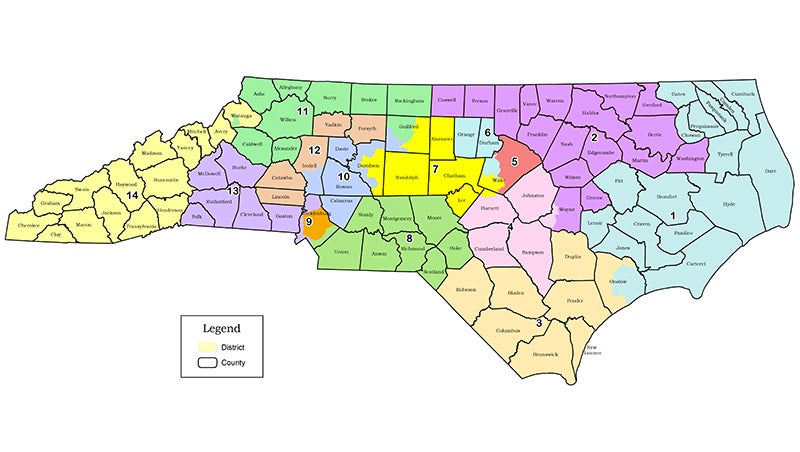North Carolina redistricting trial concludes, ruling expected by Tuesday
Published 6:31 am Monday, January 10, 2022

- Courtesy North Carolina General Assembly
|
Getting your Trinity Audio player ready...
|
By Gary D. Robertson, Associated Press
A rapid trial over North Carolina’s new congressional and legislative districts concluded Thursday with closing arguments over whether the boundaries contain unlawful gerrymanders that should be replaced for upcoming elections.
The three trial judges have until Tuesday to rule, the result of a directive by the state Supreme Court, which last month ordered a trial on redistricting lawsuits be held and delayed the March primary until May in the meantime. These three Superior Court judges previously declined to block the use of the maps, leading to the intervention by the Supreme Court. Appeals are likely to follow no matter the outcome.
While attorneys for the advocacy groups and voters who sued to overturn the maps warned democracy will be harmed with inaction by the judges, a lawyer for the Republican legislators defending the lines said the same holds true if the panel throws them out.
“These are contentious issues,” Superior Court Judge Graham Shirley said at the trial’s close.
The plaintiffs’ lawyers said evidence in this week’s trial made it overwhelmingly clear that boundaries the Republican-controlled legislature approved were rigged to entrench GOP control of most U.S. House seats and the state House and Senate chambers. North Carolina’s statewide elections, meanwhile, are usually closely divided. Republicans have held legislative majorities since 2011 and controlled the mapmaking process.
“This kind of extreme partisan gerrymandering is an assault on the most basic principles of representative democracy, is fundamentally unfair, and it violates the North Carolina Constitution,” plaintiffs’ attorney Elisabeth Theodore said. “The gerrymandering has real effects on real North Carolinians who have no chance to elect a representative who shares their views.”
For Congress, where Republicans currently hold eight of North Carolina’s 13 seats, the plan approved by the legislature in November likely would secure 10 of the 14 seats for the GOP. The state gets an extra House seat because of a growing population, particularly in urban areas where Democrats predominate.
“So under this plan, more Democratic voters translate into fewer Democratic seats,” Theodore said.
Mathematicians and researchers presented results of computer map simulations that showed the enacted congressional and legislative leaders were extreme partisan outliers — giving Republicans majorities or veto-proof majorities in the legislature even in good Democratic years. The plaintiffs said the consolidating or fracturing of black voters within districts also reduced their ability to elect preferred candidates, resulting in illegal racial bias.
GOP lawmakers contend the maps were lawfully approved. Early in the process, legislators prohibited the use of partisan and racial data in drawing maps, which were performed in open committee rooms on computers and live-streamed.
A state Supreme Court ruling in the early 2000s declared that the General Assembly “may consider partisan advantage” in drawing districts. The plaintiffs’ case has failed, GOP lawyer Phil Strach told the judges, because it failed to explain at what point allowable considerations of political advantage crossed over into illegal partisanship.
The “plaintiffs want this court to use a computer to decide if a plan is an unconstitutional gerrymander,” Strach said. “But that is simply replacing the General Assembly’s discretion with that of a computer and the math professors that developed and run the algorithms on these computers. That’s not democracy. It is in fact, a threat to democracy and a recipe for further political polarization of the citizens of North Carolina.”
Strach said the plaintiffs simply want more Democrats to be elected and held up an alternative set of maps developed for the North Carolina League of Conservation Voters in its lawsuit as one drawn without public scrutiny.
But Republicans took a hit during the trial on past pronouncements about the openness of the 2021 redistricting process.
Rep. Destin Hall, the House Redistricting Committee chairman, acknowledged in both a December deposition and testimony Wednesday that he looked at “concept maps” drawn by someone else before he drew new boundaries in the committee room. Hall testified the maps focused on a handful of regions, only gave him a “heads up” about where city lines and population centers were located and weren’t that useful.
The late disclosure contrasts with Hall’s repeated declaration that the redistricting process was the most transparent in state history.
These maps, which Hall said were provided by an aide who no longer works for him, have apparently been destroyed.
This episode, combined with other information, is “more than enough to support (an) inference of nefarious intent” by Republican lawmakers, said lawyer Hilary Klein, a lawyer for Common Cause, another plaintiff. Strach likened the concept maps to “a shiny, irrelevant object” in the plaintiffs’ case.
Two of the three trial judges presiding at this week’s trial are registered Republicans. Four of the seven state Supreme Court justices are registered Democrats.






